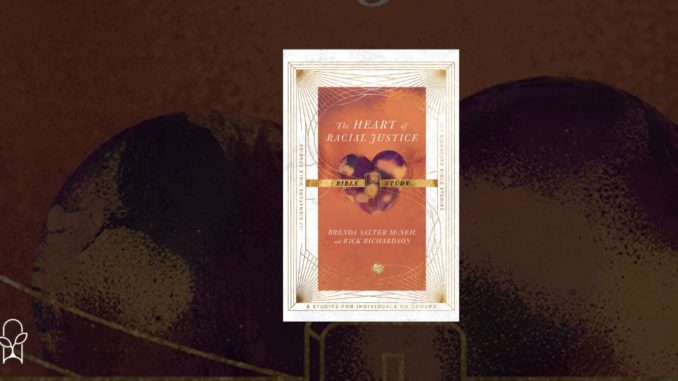
Also by this author: Heart of Racial Justice: How Soul Change Leads to Social Change
Published by IVP on January 11, 2022
Genres: Non-Fiction, Devotional
Buy on Amazon
Goodreads

For Christians, pursuing racial justice and reconciliation begins with following Scripture and the voice of the Holy Spirit. Transformation starts in each individual and community as we ask God to give us new eyes and hearts. These five studies, adapted by Steve Tamayo, are based on the groundbreaking book The Heart of Racial Justice by Brenda Salter McNeil and Rick Richardson. By focusing on key New Testament passages, readers will learn how the early church engaged with issues of reconciliation and how we too can commit ourselves to discipleship, reading, prayer, community, and witness in alignment with God's call. As companions to the IVP Signature Collection, IVP Signature Bible Studies help individuals and groups explore and apply biblical truths found in classic books. Each session features quotations from The Heart of Racial Justice matched with Scripture passages, reflection questions, and application ideas that will equip readers to connect the text to their own lives. A leader's guide and list of suggested resources are also included.
In 2004, Brenda Salter McNeil and Rick Richardson released the first edition of The Heart of Racial Justice. Now, eighteen years later, IVP has rereleased the book as part of their Signature Collection. To add to it, they’ve also released a five-session Bible study based on the book crafted by Steve Tamayo.
Using an inductive study method, The Heart of Racial Justice: Bible Study adapts the material from the main book into five themes represented by a passage of Scripture. The original book’s tagline was How Soul Change Leads Social Change. That vision shines through as the series focuses on Lordship, Scripture, Prayer, Community, and Witness.
- Session one covers chapters 1-3 of The Heart of Racial Justice and takes Acts 1:1-9 as its Scripture. The goal is to commit to the lordship of Jesus Christ by pursuing a lifestyle of personal, ethnic, and racial reconciliation.
- Session two covers chapters 4-5 and uses Acts 6:1-7 as its passage of Scripture. The stated goal is to commit to read Scripture with new eyes and to respond with a new heart to God’s call for reconciliation.
- Session three covers chapters 6-8 of the book and takes Acts 10:1-48 as its Scripture reading. The goal is to commit to prayer by listening to God and asking to be filled with the Spirit to empower you for reconciliation.
- Session four covers chapter 9 of The Heart of Racial Reconciliation and uses a litany of verses—Acts 11:19-30, Acts 13:1-3, and Acts 14:26-28. The stated goal is to commit to community by building relationships that nurture your commitment to racial and ethnic reconciliation.
- Session five finishes up the book by covering chapter 10 and, breaking from the book of Acts, uses Galatians 2:11-21 as its passage. The goal is to commit to public witness by sharing your heart for reconciliation and standing up for racial and ethnic justice.
Each section has three different types of questions about the selected Bible passage. There are observational questions that encourage you to read the passage deeply and understand it contextually. There are interpretive questions which dive into the meaning of the passage. Then, there are application questions that imagine ways in which the passage could be put into practice. There are two reflective questions that begin the study, followed by seven questions after the Scripture reading. Then, there are some opportunities to respond and a closing prayer.
I would note that this is a Bible study, not a book study. While it uses the themes of The Heart of Racial Reconciliation, the discussion this book engenders is around the selected Scripture, not the book itself. For study groups that have the time to go deeper and engage the book communally, I would recommend the group leader including discussion questions based on the book or allowing time for participants to reflect on what they’ve read throughout the week.
While the Bible study is solid, there’s nothing that really stands out as exceptional about it. It’s an average Bible study based on an extraordinary book. I would have liked to have seen a closer connection between the main book and the study, with more of the content discussed in depth. As a Bible study, it’s pretty tame and, unless you have a talkative group, you’ll exhaust the question prompts pretty quickly.
If I was to use this in a Bible study context, I would merge this with the discussion material provided in Appendix 3 of The Heart of Racial Justice to help build a more robust and participatory discussion of racial reconciliation and social justice. Bring both those things together and you have a quality study.
